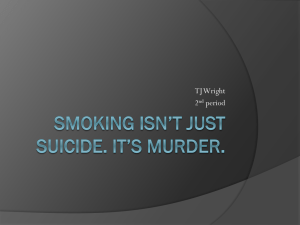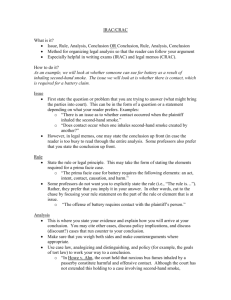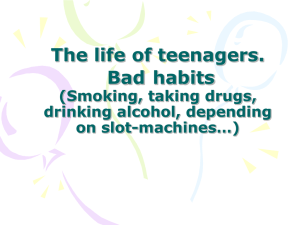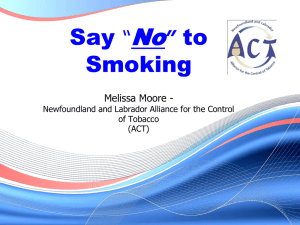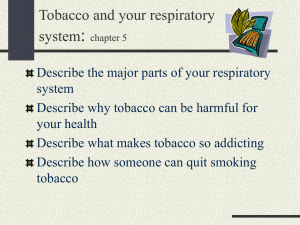Second-Hand Smoke… - Heartland Alliance
advertisement
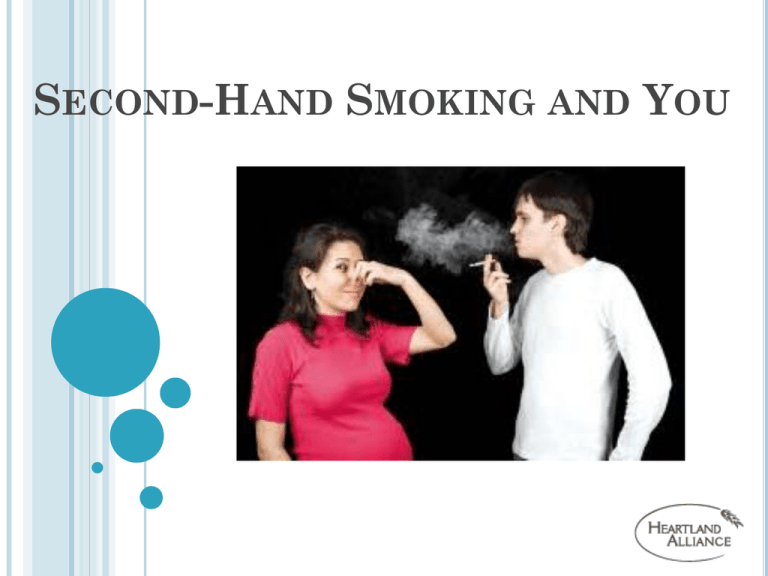
SECOND-HAND SMOKING AND YOU TRUE OR FALSE? Smoking is harmful to your health. TRUE OR FALSE? Smoking is harmful to your health. TRUE TRUE OR FALSE? Tobacco smoke is only harmful to people who are smoking cigarettes, pipes or cigars. TRUE OR FALSE? Tobacco smoke is only harmful to people who are smoking cigarettes, pipes or cigars. FALSE WHAT IS SECOND-HAND SMOKE? Second-hand smoke is tobacco smoke that is breathed in by someone who is not smoking. WHERE DOES SECOND-HAND SMOKE COME FROM? Second-hand smoke comes from the smoke breathed out by a smoker. It also comes from the smoke that leaves a cigarette, pipe or cigar. WHERE CAN SECOND-HAND SMOKING HAPPEN? Second-hand smoking can happen anywhere someone is smoking. However, it is most serious when it happens inside. Why is Tobacco Smoke harmful to your health? Cigarettes are made with hundreds of dangerous chemicals that are toxic and poisonous. When cigarettes are burned, these chemicals are released into the air. They are harmful to anyone who breathes them in. Many of these chemicals can cause serious health problems such as cancer and heart disease. Cancers Linked to Second-Hand Smoke Lung Cancer Bladder Cancer Nasal Sinus Cavity Cancer Cervical Cancer SECOND-HAND SMOKE AND YOUR HEART •Heart Attack • Blocked Arteries •Coronary Heart Disease BREATHING SECOND-HAND SMOKE DURING PREGNANCY MAY CAUSE … •Low birth weight •Increased risk of Sudden Infant Death Syndrome (SIDS) IF CHILDREN BREATH SECONDHAND SMOKE, THEY CAN DEVELOP… • Asthma • Chronic cough • Ear infections • Dental cavities • Eye and nose irritation TRUE OR FALSE? When tobacco smoke is no longer visible and its odor is gone, there is no more risk from second-hand smoke. TRUE OR FALSE? When tobacco smoke is no longer visible and its odor is gone, there is no more risk from second-hand smoke. FALSE SMOKING IN ILLINOIS AND CHICAGO • In the state of Illinois, smoking is banned in all enclosed workplaces. This includes restaurants, schools, libraries, hospitals and theaters. It is also banned within 15 feet (4.5 meters) of the doorways to such places. • A person caught breaking these laws can be fined up to $250. • Local governments can also pass laws restricting smoking. These laws can be even stricter than state laws. WHAT YOU CAN DO ABOUT SECOND-HAND SMOKE •Do not allow smoking in your house or car. (If people must smoke, tell them to smoke outside.) • Do not smoke near pregnant women or children, even if you are outside. •Avoid indoor places where people smoke. •If other people care for your child, make sure they don’t smoke around your child. THE END Sources Used: http://quitsmoking.about.com http://www.skynet.ie/~stephen/reports/bc4927.html (The Toxicology of Cigarette Smoke and Environmental Tobacco Smoke by Stephen Mulcahy ) http://www.smokefree.gov http://www.cancer.org http://www.cdc.gov http://www.lungusa.org http://www.ed.gov Presentation compiled for Refugee Health Programs by Preeti Karmali, 2009 Summer Intern at Heartland Health Outreach. Updated and modified by Karl Doerfer 12/2009.
